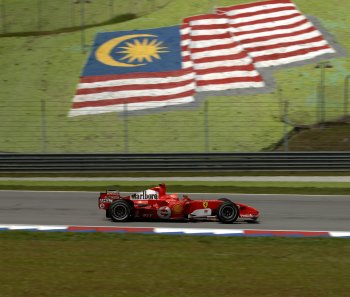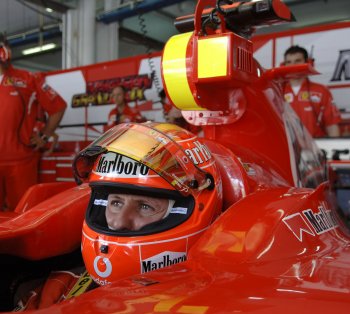|
For the first
time since this event moved from Adelaide to Melbourne in
1996, the Australian Grand Prix is not the opening round of
the Formula 1 World Championship. The reason for this is to
avoid a clash with the Commonwealth Games as there would not
have been enough hotel rooms to cope with both events at
once.
It is also a fair assumption to make that some Melbournians
would have been annoyed at having to chose between attending
a day at the Grand Prix or the athletics competition,
because like all Australians, sport is a key part of their
life. "Melbourne is a special place when it comes to sport,"
reckons Michael Schumacher's race engineer, Chris Dyer. And
why would Dyer's opinion be relevant on this subject?
Because the thirty-eight year old is an Australian national,
whose family lives just over a hundred kilometres away from
the city that hosts the third round of the Formula One World
Championship. "I think one thing about Melbourne is that it
has a very strong sporting heritage and it doesn't matter if
it's the grand prix or Australian Rules Football, or a one
day cricket match, the whole city is always behind it."
Dyer has had to wait a few weeks longer than usual for his
annual home visit. "It's still my home grand prix, so I
don't mind what time of year it takes place," he says. "From
a work point of view, I guess in some ways it might make it
a little easier than normal, because the slot as first race
of the year can be a bit busier than usual, as it is the
first time back after winter, with a new car. Maybe everyone
is a little rusty and needs to learn the new rules.
Hopefully, we got all that out of the way in Bahrain and
Malaysia and by the time we get to Melbourne, we should be a
bit more on top of things and more relaxed."
The European idea of Australian weather is that the
continent is always extremely hot and while this is true of
much of the country, Melbourne is known for having an almost
European climate, with distinct seasons, so what effect will
have the shift to this later date on the calendar? "I think
the weather will be a little bit cooler, but just as
variable as ever," predicts Dyer. But it is difficult to be
sure about what we can expect. A couple of days before the
Malaysian GP, it was 39 degrees in Melbourne and a day later
it was pouring with rain!"
The circuit, located in Albert Park, just a few kilometres
south of the city centre is a temporary facility and each
year, the organisers have to be build up and pull down all
the circuit furniture - barriers, fencing and grandstands.
But the track still feels like a real racing circuit. "It is
not a street circuit by nature, like Monaco for example, it
is more of a normal track, so it is not so bumpy, there's a
bit more run-off and a few more fast corners," is how Dyer
evaluates it. "But it's still a compromise between being
fast down the straights and having good grip through the
corners, just like most circuits. Especially this year with
the V8, it will be quite high downforce.
|
 |
|
Michael Schumacher during the Malaysian Grand Prix:
"Perhaps he is a little bit more relaxed now, but at
the same time this winter I think he has worked
harder than at any time since I have been at
Ferrari, in terms of the number of days we tested
and how early he started testing," reckons Chris
Dyer. |
|
|
 |
|
Michael Schumacher in Malaysia: "I see no sign of
him retiring," states Chris Dyer. "But I have no
idea really, as it is not something we talk about.
We have a job to do this year and we will get on
with that. I have no opinion myself. The critical
thing is how he feels about it, how much he still
enjoys racing and how much he wants to do it. I see
no sign that he is enjoying it less, so I cannot see
any reason to indicate that he is going to stop. I
think he will make that decision himself and when he
has we will know about it." |
|
|
"It can be quite
hard on brakes as well and usually there is a question mark
over brake performance as it has been the first race. But
this year the brake situation is clearer as we have already
had Bahrain which is traditionally tough on brakes, so we
should be a bit more prepared. In terms of strategy, I
expect it will most likely be a two stop strategy. The new
qualifying format means that a one stop race is not so
likely. You used to have the penalty of carrying the fuel in
qualifying, which still makes it difficult, even if things
are the same between a one and a two stop in the race.
However, carrying more fuel increases your chances of being
further back on the grid, which carries a higher chance of
getting involved in accidents. The new qualifying format
pushes you more to a two stop."
Dyer has been Michael Schumacher's race engineer since the
end of 2002, so the years spent working closely together
means the Australian is ideally placed to assess how the
seven times champion has changed over the years. "Perhaps he
is a little bit more relaxed now, but at the same time this
winter I think he has worked harder than at any time since I
have been at Ferrari, in terms of the number of days we
tested and how early he started testing," reckons Chris. "He
tested before Christmas which he has never done before. He
may be a bit more chilled and relaxed at the track but he is
working harder than ever before." Which leads to the obvious
question being asked at the moment: is Schumacher likely to
retire soon? "I see no sign of him retiring," states Dyer.
"But I have no idea really, as it is not something we talk
about. We have a job to do this year and we will get on with
that. I have no opinion myself. The critical thing is how he
feels about it, how much he still enjoys racing and how much
he wants to do it. I see no sign that he is enjoying it
less, so I cannot see any reason to indicate that he is
going to stop. I think he will make that decision himself
and when he has we will know about it."
Dyer himself has also grown older in the job and admits his
attitude has also changed. "With the years comes a bit more
experience, perhaps you can be more relaxed and take the bad
days and put them behind you a bit more easily," he says
philosophically. "When I first started I tended to worry
more - did I do a good job this weekend? did I make all the
right decisions? I used to think that way, but now I accept
that sometimes it does not matter what you do, you can still
have a bad weekend. I'm 38, but that's 38 people-years but
I'm sure there's a multiplication factor for Formula 1
years!"
|
|
|
|
![]()
![]()